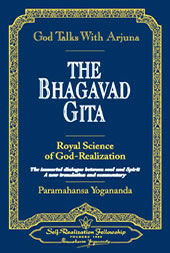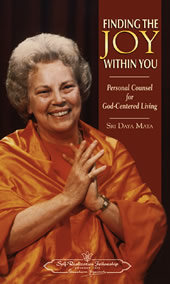RIGHT KNOWLEDGE
I will tell you of That which is to be known, because such knowledge bestows immortality. Hear about the beginningless Supreme Spirit—He who is spoken of as neither existent (sat) nor nonexistent (asat).
—The Bhagavad Gita XIII:12
Benefits and Pitfalls of Scriptural Study
Knowledge of the scriptures is beneficial only when it stimulates a desire for practical realization; otherwise, theoretical knowledge gives one a false conviction of wisdom. Unrealized knowledge of scriptures may thus become a detriment to the practical realization of spiritual truths. But when theoretical scriptural knowledge is continuously converted into inner perceptions of wisdom, that knowledge is a source of redemption. Many pundits and learned professors—for all their mental acumen— daily demonstrate by their uncontrolled lives their failure to put philosophy to any practical use.
A man without scriptural knowledge or inner realization is sadly ignorant. A person with a theoretical knowledge of scriptures but without Self-realization is like a man who eats much food but cannot digest it. The man with divine realization, even if lacking scriptural knowledge, has attained God and is a worthy example to society. A man possessing both scriptural knowledge and Self-realization has not only attained God but is an admirable teacher for imparting God-consciousness to others.
My Guru never permitted his disciples
to read the stanzas of the Bhagavad Gita or
Patanjali with a merely theoretical interest.
"Meditate on the scriptural truths until you become one with them," he would say.
(God Talks With Arjuna: The Bhagavad Gita, p.495)
![]()
Right study of the scriptures (svadhyaya) leads to emancipation. A true devotee does not suffer with mental indigestion as does one who gorges himself on scriptural lore without understanding its meaning and without assimilating it into his life. Theoretical study is helpful when it inspires a devotee to practice the holy teachings. Wisdom thoughts are faithful guides and protectors when they become one's constant companions.
Redemption does not come from what one knows intellectually, but from what one becomes as a result of that knowledge. There must be a rational connection between one's learning and oneself, so that a truth becomes such an integral part of the being that it cannot be dislodged by contrary temptations or doubts. This is intuitional learning, or realization.
![]()
All beliefs should be thoroughly scrutinized. Overindulgence in study should be avoided. Indiscriminate study, especially of religious books written by spiritual novices or untried enthusiasts, results mostly in indigestible hashes of imagination, emotion, and at best a diluted realization.
Patanjali's Yoga Aphorism, the Christian Bible, and Hindu Bible (Bhagavad-Gita), and a few other books written by men of realization should be studied, a little at a time, and meditated upon for hours or for days together. The best time to read scriptures is after practising meditation, when the intuitive feeling is awake. (See the book list below.)
![]()
If you read one hour, then write for two hours, and reflect for three hours. This is the proportion that should be observed to cultivate the power of reason.
![]()
Before studying the scriptures, calm and steady yourself, then take two or three lines and meditate on them for several minutes. When the meaning becomes one with yourself, close the book and go about your business. One hour of regular meditation is worth more than one month of theoretical study of the scriptures. In meditation, direct knowledge is received.
![]()
The wisdom-manifesting yogi fills his mind with scriptural studies and spiritual meditative perceptions that contribute to soul-realization. When he attains perfect inner enlightenment, he intuitively perceives the meanings in all forms of knowledge, and realizes the whole truth of divine wisdom as manifested within his Self. ...
The devotee bent on liberation understands that all learning pertaining to the phenomenal worlds is partial, uncertain, relative, and unsatisfying. Realization of God is the only true, permanent, and absolute knowledge. (God Talks With Arjuna: The Bhagavad Gita, p.886)
![]()
Seek Knowledge From a True Guru
Jesus Christ was crucified once, but his teachings suffer crucifixion every day at the hands of men of limited vision. Jesus Christ's teachings cannot be understood just by reading the Bible, even a thousand times, or all through life. The truths in the Bible can be known only by living and trying out in everyday life the principles taught in the book.
![]()
Theoretical knowledge cannot give you realisation about God. So don’t waste your time on too much theory. Those who do so becomes lost in the jungle of reason and never get beyond mere theories. In the process of reasoning and reasoning they never perceive truth, for truth is beyond reason. Most intellectualists thus become bound by their own conclusions.
![]()
Seek knowledge from a true guru. Decide upon the best and quickest method of meditation as taught by the great saints and God-realized gurus of India, and then meditate deeper and deeper every day, praying to God with a burning heart, "Reveal Thyself!"
Right Knowledge
God Talks With Arjuna: The Bhagavad Gita
— A New Translation and Commentary
By Paramahansa Yogananda
In this monumental two-volume work, Paramahansa Yogananda reveals the innermost essence of India's most renowned scripture. Exploring its psychological, spiritual, and metaphysical depths, he presents a sweeping chronicle of the soul's journey to enlightenment through the royal science of God-realization.
The Second Coming Of Christ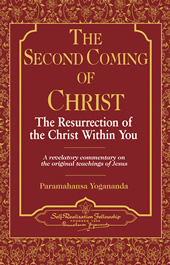
The Resurrection of the Christ Within You
A revelatory commentary on the original teachings of Jesus
By Paramahansa Yogananda
In this unprecedented masterwork of inspiration, Paramahansa Yogananda takes the reader on a profoundly enriching journey through the four Gospels, verse by verse, and illumines the universal path to oneness with God taught by Jesus to his immediate disciples but obscured through centuries of misinterpretation: "how to become like Christ, how to resurrect the Eternal Christ within one's Self." Never before available in its entirety, this landmark work by one of the most revered spiritual teachers of our time transcends divisive sectarianism to reveal a unifying harmony underlying all true religions. A groundbreaking synthesis of East and West, it imparts the life-transforming realization that each of us can experience for ourselves the promised Second Coming — awakening of the all-fulfilling Divine Consciousness latent within our souls. The text is accompanied by more than 30 full-color and sepia reproductions of paintings and rare drawings of the life of Jesus, as well as a comprehensive glossary, index, and subject annotations.
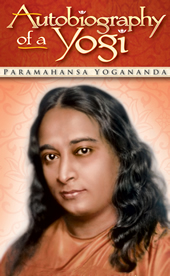 Autobiography of a Yogi
Autobiography of a Yogi
By Paramahansa Yogananda
Selected as one of the 100 Best Spiritual Books of the 20th Century, this acclaimed autobiography presents a fascinating portrait of one of the great spiritual figures of our time. With engaging candour, eloquence, and wit, Paramahansa Yogananda narrates the inspiring chronicle of his life—the experiences of his remarkable childhood, encounters with many saints and sages during his youthful search throughout India for an illumined teacher, ten years of training in the hermitage of a revered yoga master, and the three decades that he lived and taught in America. Also recorded here are his meetings with Mahatma Gandhi, Rabindranath Tagore, Luther Burbank, the Catholic stigmatist Therese Neumann, and other celebrated spiritual personalities of East and West.
Autobiography of a Yogi is at once a beautifully written account of an exceptional life and a profound introduction to the ancient science of yoga and its time-honored tradition of meditation. The author clearly explains the subtle but definite laws behind both the ordinary events of everyday life and the extraordinary events commonly termed miracles. His absorbing life story thus becomes the background for a penetrating and unforgettable look at the ultimate mysteries of human existence.
Excerpts from Autobiography of a Yogi
Chapter 14: An Experience in Cosmic Consciousness
Chapter 43: The Resurrection of Sri Yukteswar
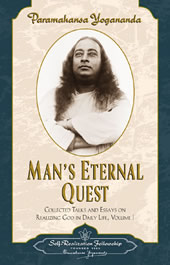
Man's Eternal Quest
Volume I of Sri Yogananda's lectures and informal talks, presenting many aspects of his "how-to-live" teachings and exploring little-known and seldom-understood aspects of meditation, life after death, the nature of creation, health and healing, the unlimited powers of the mind, and the eternal quest that finds fulfillment only in God.
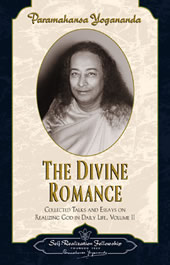
The Divine Romance
Volume II of Paramahansa Yogananda's lectures, informal talks, and essays. Among the wide-ranging selections: How to Cultivate Divine Love; Harmonizing Physical, Mental, and Spiritual Methods of Healing; A World Without Boundaries; Controlling "Your Destiny; The Yoga Art of Overcoming Mortal Consciousness and Death; The Cosmic Lover; Finding the Joy in Life.
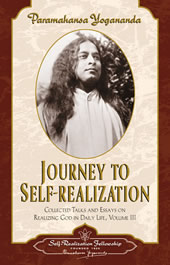
Journey to Self-realization
The Collected Talks and Essays,
Volume III, presents Sri Yogananda's unique combination of wisdom, compassion, down-to-earth guidance, and encouragement on dozens of fascinating subjects, including Quickening Human Evolution, How to Express Everlasting Youthfulness, and Realizing God in Your Daily Life.
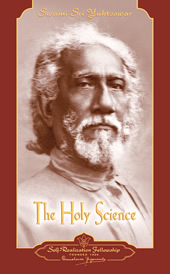
The Holy Science
by Swami Sri Yukteswar
Excerpts from The Holy Science
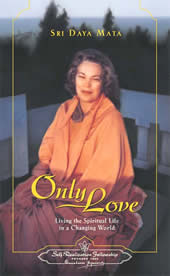
Only Love
by Sri Daya Mata
Finding Joy Within You
by Sri Daya Mata
![]()
